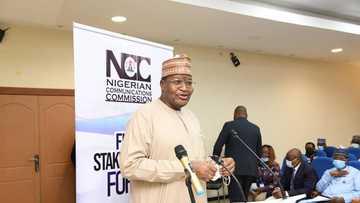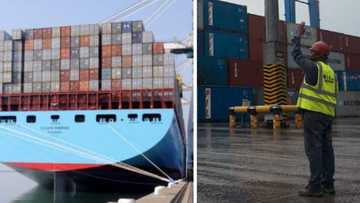FIRS Boss, Nami Says Nigeria Needs to Implement Tough Reforms to Increase Tax Revenue
- According to the Chairman of the Federal Inland Revenue Service, Nigeria needs to take a tough stance on tax revenue
- Muhammad Nami, stated recently that the move is vital to ramp up revenue for the country
- Other tax experts also advocated the use of technology in tax collection in Nigeria
PAY ATTENTION: Click “See First” under the “Following” tab to see Legit.ng News on your Facebook News Feed!
For Nigeria to attain optimum tax revenue collection capacity across the Federal, State, and Local Government tax authorities, the country must make hard but necessary reforms that would yield long-term benefits.
The statement was the position stated by the Chairman of the Joint Tax Board (JTB), Muhammad Nami, who is also the Executive Chairman of the Federal Inland Revenue Service (FIRS) at the 153rd Meeting of the Board, which was held today in Abuja with the theme: “Harmonization and codification of taxes at the National and Sub-national levels: Key to achieving a tax-friendly environment in Nigeria.”

Source: Twitter
Nigeria needs to move aggressively in tax revenue
Nami stated that for progress in taxation, tax authorities must continue to explore and adopt measures and innovative initiatives that will optimize tax revenue for all levels of government.
PAY ATTENTION: Follow us on Instagram - get the most important news directly in your favourite app!
Nami said:
“As the new administrations attempt to address the many socioeconomic challenges facing the nation on many fronts, it becomes imperative for all the State levels to shake off any lethargic antecedents and focus on the goal of a national resurgence.
“Since the dawn of our current democratic dispensation, the importance of taxation has continued to be reiterated and reinforced by all, and the critical role that tax revenue plays in funding government and governance cannot be over-emphasized.
Tax Expert reveals reason for low tax revenue in Nigeria
Reports say the Chairman of the Joint Tax Board further assured executive chairpersons of State Revenue Authorities present that given the current administration’s tax policy direction, the country was on the pathway to eradicating multiplicity of taxes as a core of its overall economic regeneration objectives.
Taiwo Oyedele, Chairman of the Presidential Fiscal Policy & Tax Reforms Committee, highlighted that multiple taxation was causing low tax morale in the country and discouraging investments while creating room for corruption and making business difficult.
Oyedele further noted that the solution to the country’s revenue challenges is not to introduce more taxes, but to focus on the few taxes that are high yielding, noting that with these, tax authorities would be able to collect far more than is currently being compiled.
He stated that for the government to raise more revenue, it needed to reach a point where the total number of taxes collected at the Federal, State, and Local government levels would be at a single digit.
“We also need to clarify taxing rights. We need to integrate tax collection functions—that is, a single revenue agency must collect all revenues that are to be collected. Government must also do well to fund our tax agencies well. We also need to harmonize revenue administration and simplify our approach to tax compliance,” Oyedele stated.
He further advocated for the country’s tax authorities to use more technology, review the country’s constitution and tax laws, and revisit Nigeria’s fiscal federalism concept.
FIRS rakes in N5.5 trillion in tax revenue in 6 months, exceeds expectations
Legit.ng reported the Federal Inland Revenue Service (FIRS) collected a total tax revenue of N5.5 trillion for six-month period from January to June 2023. Legit.ng earlier reported that FIRS set a new record after collecting over N10 trillion in revenue in 2022.
It was the first time the revenue agency crossed the N10 trillion mark in tax revenue collection.
The agency's realisation of this feat is coming despite the fact that Nigerians have been plagued by several economic hardships in the course of the six months including naira scarcity, inflation, fuel subsidy removal and high petrol prices.
Source: Legit.ng





